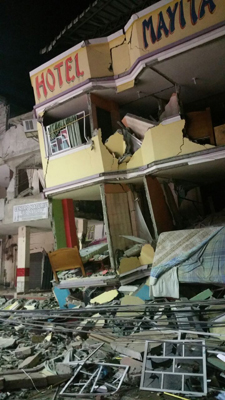7.8-magnitude earthquake kills dozens in Ecuador
QUITO, Ecuador --A powerful, 7.8-magnitude earthquake shook Ecuador's central coast on Saturday, killing at least 41 people and spreading panic hundreds of miles away as it collapsed homes and buckled a major overpass.
The U.S. Geological Survey said the shallow quake, the strongest in decades to hit Ecuador, was centered 16 miles south-southeast of Muisne, a sparsely populated area of fishing ports that's popular with tourists.
Vice President Jorge Glas said in a televised address that there were initial reports of 41 dead in the cities of Manta, Portoviejo and Guayaquil -- all several hundred miles from where the quake struck shortly after nightfall. The death toll is likely to rise as reports from the worst-hit areas come in.
"We're trying to the most we can but there's almost nothing we can do," said Gabriel Alcivar, mayor of Pedernales, a town of 40,000 near the epicenter. He pleaded for rescuers as dozens of buildings in the town were flattened, people trapped and looting broke out amid the chaos. "This wasn't just a house that collapsed, it was an entire town."
Among those killed was the driver of a car crushed by an overpass that buckled in Guayaquil, the country's most populous city.
On social media, residents shared photos of homes collapsed, the roof of a shopping center coming apart and supermarket shelves shaking violently. In Manta, the airport was closed after the control tower collapsed, injuring an air force official. Guayaquil's international airport was also closed because of a lack of communications.
Hydroelectric dams and oil pipelines in the OPEC-member nation were shut down as a precautionary measure.
Reuters reported the country's Geophysics Institute issued a bulletin saying there was "considerable damage" near the epicenter and in Guayaquil, without providing further details.
President Rafael Correa, who is in Rome after attending a Vatican conference Friday, called on Ecuadoreans to stay strong while authorities monitor events.
He said on Twitter that he had signed a decree declaring a national emergency but that the earliest he could get back to Ecuador is Sunday afternoon. He said that there are "dozens of dead" from the earthquake.
The Pacific Tsunami Warning Center said hazardous tsunami waves are possible for some coasts. While the government hadn't issued a tsunami alert, Glas urged residents along the coast to move to higher ground and towns near the epicenter were also being evacuated as a precautionary measure.
Barry Hirshorn at the Pacific Tsunami Warning Center told CBS News any possible tsunami waves were not likely to range beyond one to three feet, because the quake did not strike a particularly sensitive area of the ocean floor. He said that property damage and landslides were more likely consequences than a dangerous tsunami.
An emergency had been declared in six of Ecuador's 24 provinces, while sporting events and concerts were cancelled until further notice nationwide.
"It's very important that Ecuadoreans remain calm during this emergency," Glas said from Ecuador's national crisis room.
The quake was felt across the border in Colombia, where it shook residents in Cali and Popayan, and Peru briefly issued a tsunami warning.
In Ecuador's capital Quito, more than 100 miles away from the epicenter, the quake was felt for about 40 seconds and people fled to the streets in fear. The quake knocked out electricity in several neighborhoods and six homes collapsed but the situation under control and power being restored, Quito's Mayor Mauricio Rodas said.
"I'm in a state of panic," said Zoila Villena, one of many Quito residents who congregated in the streets. "My building moved a lot and things fell to the floor. Lots of neighbors were screaming and kids crying."
"I was in my house watching a movie and everything started to shake. I ran out into the street and now I don't know what's going to happen," Lorena Cazares, 36, a telecommunications worker in Quito, told Reuters.
The USGS originally put the quake at a magnitude of 7.4 then raised it to 7.8. It had a depth of 12 miles.
At least 36 aftershocks followed, one as strong as magnitude 6, and authorities urged residents to brace for even stronger ones in the coming hours and days.
The quake comes on the heels of two deadly earthquakes across the Pacific, in the southernmost of Japan's four main islands. A magnitude-6.5 earthquake struck Thursday near Kumamoto, followed by a magnitude-7.3 earthquake just 28 hours later.
The quakes have killed at least 41 people and injured about 1,500, flattened houses and triggered major landslides.
